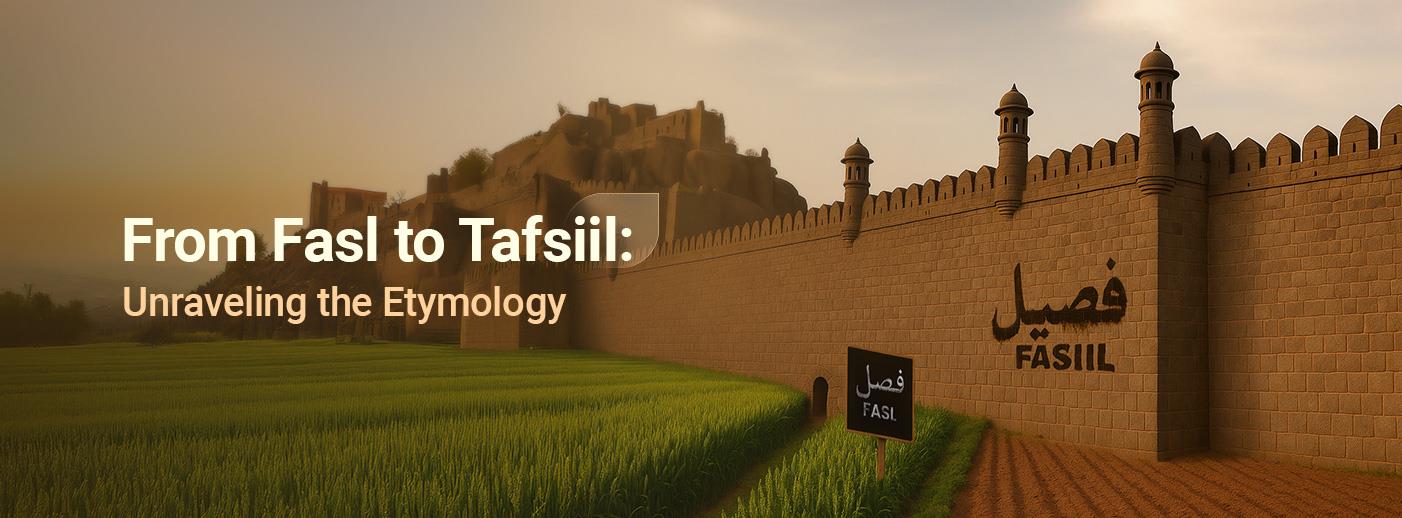Top searched
Saved words
khisyaanii billii khambaa noche
an embarrassed or ashamed person tends to vent his/her feeling by quarrelling
be-niyaaz
without want, free from want, wanting nothing, not in need, able to dispense, independent, carefree
From Fasl to Tafsiil: Unraveling the Etymology

The moment you hear the word “Fasl,” don’t the images of lush green fields, the golden shimmer of ripening crops, and the sweat-drenched smiles of hardworking farmers come alive in your mind? Its plural “Faslein” evokes a sense of abundance and harvest.
But this Arabic-origin word. “Fasl” wears many cloaks — time, season, crop, harvest, partition, separation, distance, section — each meaning opening a new door of expression.
Fasl as Seasons
If you are fond of Urdu poetry, you must have heard of “Fasl-e-Gul” — the season of flowers, the spring that poets have adorned with colors and metaphors of joy. It is also lovingly called “Fasl-e-Bahaar” or “Mausam-e-Bahaar.”
These words have forever remained symbols of vibrancy, freshness, and romance in the world of Urdu verse.
Fasl as a Division
The same word, when placed in the world of books, transforms into a chapter or section. A “Fasl” marks a new beginning, a new theme — much like seasons that change their colors.
The Word Faasila
From “Fasl” comes another familiar companion: “Faasila” (فاصلہ) — distance.
This faasila can be measured in time or space:
• “Sadiyon ka faasila” — centuries apart, a gulf of time that separates eras or civilizations.
• “Meilon ka faasila” — miles apart, the physical stretch between two places.
Isn’t it beautiful how a single root word can describe both the ache of distance and the gentle passage of time?
Faisla — The Verdict
Another strong word from this family is “Faisla” (فیصلہ) — a decision, settlement, or verdict that brings clarity.
And when we say “Qaul-e-Faisal” (قولِ فیصل), it means the ultimate judgment — a statement that settles all debate.
The phrase “Qaul-e-Faisal” also gained historic significance through Maulana Abul Kalam Azad. It refers to the detailed record of his trial proceedings and defense speeches during the 1912 sedition case in Kolkata.
This document was no mere explanation of the charges — it was a bold proclamation of India’s freedom struggle and the voice of a heart that refused to bow to injustice.
Fasiil — The Protective Wall
Have you ever seen the towering walls of a fort? In Urdu, they are called “Fasiil” (فصیل) — a rampart, a fortress wall, a “Shahr-Panaah” (city protector). These walls stood tall, shielding towns and civilizations from danger.
From Fasl to Tafsiil
The family of “Fasl” is large and fascinating, and though we’ve only explored the most familiar faces, the richness of this root is endless. Even the word “Tafsiil” (تفصیل) — meaning details or elaboration— belongs to this lineage.
Delete 44 saved words?
Do you really want to delete these records? This process cannot be undone






